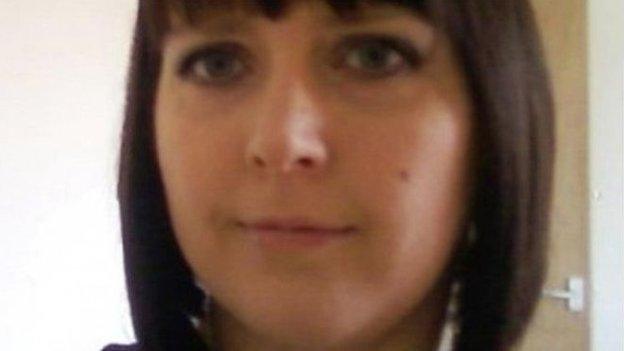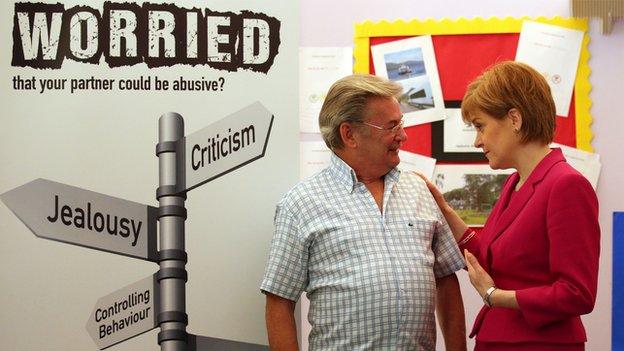'Clare's Law' to be extended across Scotland
- Published
A similar scheme in England and Wales has seen more than 1,300 people warned about their partner's violent past
A trial scheme which allows people to be told if their partner has been violent in the past is to be extended across Scotland.
The six-month trial in Aberdeen and Ayrshire saw 22 people warned their partners had history of domestic abuse.
Disclosures can be triggered by victims, friends, relatives, social workers or police officers.
The disclosure scheme, known as Clare's Law, will be rolled out across the country later this year.
It was named after Clare Wood, who was strangled and set on fire by George Appleton, her violent and obsessive former boyfriend, in Salford, Greater Manchester, in 2009.
Appleton had a history of violence and harassment against women which Ms Wood did not know about.
Her father, Michael Brown, has campaigned for people to have the right to ask for information about partners, and for the police and other agencies to have the power to take the initiative and tell someone if there are grounds for concern.

Clare's Law: The Facts
Otherwise known as the 'Domestic Violence Disclosure Scheme', or Disclosure Scheme for Domestic Abuse Scotland (DSDAD) in Scotland
Rolled out in England and Wales last year
Since then, 3,760 applications and more than 1,300 domestic abuse disclosures have been made in England and Wales
The Scottish trial in Aberdeen and Ayrshire saw 59 cases being considered, with 22 people so far being informed about their partner's violent past
30 of those cases were in Aberdeen, with 8 disclosures being made


Clare Wood did not know that George Appleton had a long history of violence against women
Mr Brown, who is originally from Aberdeen, welcomed the introduction of Clare's Law in Scotland.
He said: "It is heartening to see the success of the pilots and to know that the people given these disclosures will now hopefully not be victims of domestic abuse.
"Saving lives and protecting people has to be our ultimate aim, this is what makes all of our efforts worthwhile."
'An abhorrent crime'
Mr Brown was accompanying First Minister Nicola Sturgeon and Scotland's chief constable, Sir Stephen House, on a visit to Edinburgh Women's Aid, as they confirmed that the disclosure scheme will be extended across the whole country.
Ms Sturgeon said: "There is no excuse or place for domestic abuse in Scotland and we need to do all we can to ensure we protect people from what is an abhorrent crime.
"The victims of this unacceptable behaviour are predominantly female but males are also targeted; we must make sure that everyone is offered protection and information which reduces the risk of harm. I firmly believe that people who have concerns that their partner may have a history of domestic abuse should be able to find out."

Nicola Sturgeon with Michael Brown, the father of Clare Wood
Police Scotland figures show that the number of domestic abuse incidents reported in Scotland from 1 April 2014 - 31 March 2015 increased by 1,076 to 59,471 compared to the same period the year before.
The authorities hope that the disclosure scheme could play a part in protecting hundreds of potential victims, although there is an acceptance that disclosing information will not by itself solve the problem of domestic abuse.
Police Scotland Chief Constable, Sir Stephen House, said: "By expanding this scheme, there is the potential to protect hundreds of people and to stop them become the victims of abusers, either directly or indirectly. And it is a clear signal to those who would abuse others that they cannot hide and their abusive history will be disclosed if it means protecting others.
"This has to be one part of a long term approach to supporting victims which ensures that their experiences and the long term effect of disclosure on the people who ask is measured. Working with our partners, we will continue to support people through the disclosure process and to prevent people becoming victims of this terrible crime."

Clare's Law: How to use it
Any person can make an application about their partner if they are concerned they may harm them; and any concerned third party (such as a parent, relative, neighbour or friend) can also make an application if they are concerned.
However, a third party person making an application would not ordinarily receive information about the partner. Information will only be given to someone who is in a position to use it to protect the person at risk.
Contact the police: You can do this online, external, in person either at a police station or on the street, or by phoning 101.
Initial contact with the police: At this stage you will need to provide basic details about yourself, and what prompted your enquiry. If when speaking to the police you allege a crime against your partner, police will investigate this as a crime and may arrest your partner. The police will run initial checks to establish if there is an immediate risk.
Face to face meeting to complete the application: At this stage you will need to provide proof of identification. The police will run more checks and speak to other services such as the Social Work Departments and Prison Service. The maximum amount of time from this step until potential disclosure should be 45 days.
Multi-agency meeting to consider disclosure: The police will meet with partner agencies such as Social Work Services to decide whether any disclosure is "lawful, necessary and proportionate" to protect you from your partner. If they decide to disclose information, they will decide who should receive it and set up a safety plan to provide you with help and support.
Potential disclosure: If the checks show a record of violent offences or other information that indicates a pressing need to make a disclosure to prevent further crime, the police may disclose this information to you or a third party. If the checks do not show that there is a pressing need to make a disclosure to prevent further crime, the police will tell you that.
More information can be found here., external

The move has been welcomed by the Chief Executive Officer of Edinburgh Women's Aid, Linda Rodgers, who said: "More than 2,000 women used Edinburgh Women's Aid services last year.
"We welcome anything that makes women safer and we look forward to working with our partners in police in government towards a Scotland where everyone, no matter what their community, can live without fear."
Conservative leader Ruth Davidson said her party had supported Clare's Law for "a long period of time."
"This is a sensible change which helps people find out if a partner has a history of violence," she said.
"Such knowledge could stop attacks in the future. This law isn't an answer to domestic violence by itself, but it is another piece in the jigsaw offering extra protection to victims and I welcome its overdue introduction."